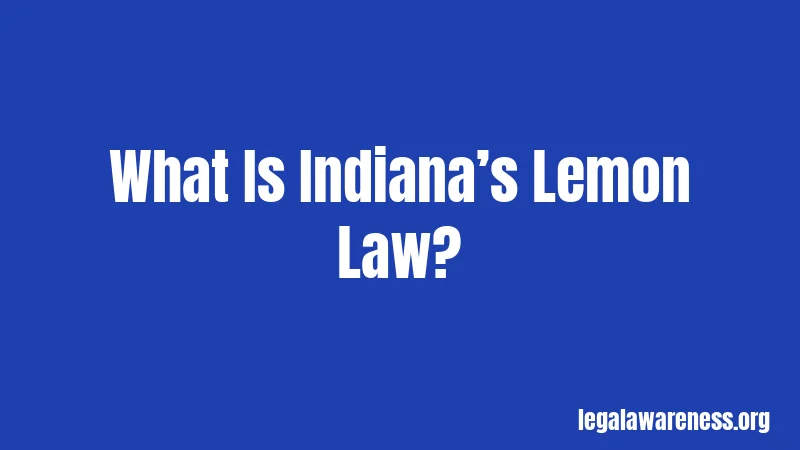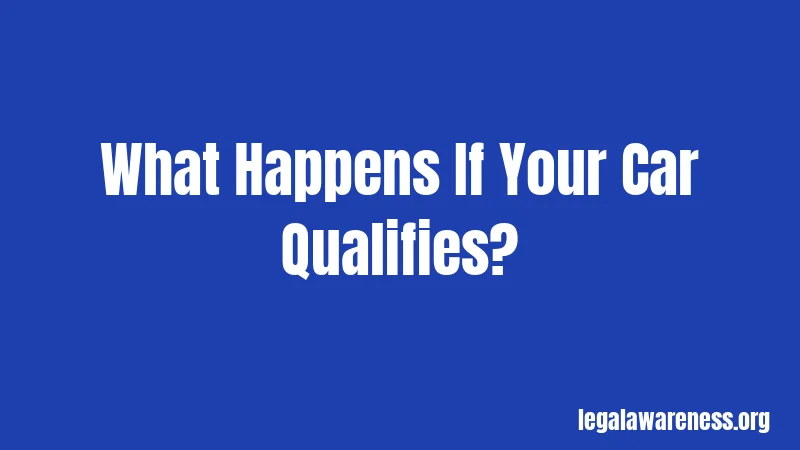Indiana Lemon Laws in 2026: Your Complete Protection Guide
You bought a car. You trusted the dealer. But now your brand-new vehicle keeps breaking down. So simple, right? You should be able to get your money back.
Here’s the thing: Indiana has a lemon law that protects you if your vehicle has defects that the dealer can’t fix. But you need to know the rules. And trust me, they matter.
What Is Indiana’s Lemon Law?

Indiana calls it the Motor Vehicle Protection Act. Honestly, that’s a boring name for a pretty powerful law. It’s basically your safety net when you get stuck with a defective car.
The law protects buyers and lessees when a vehicle has defects that the dealership can’t fix after you’ve given them a reasonable chance. The manufacturer can’t just keep saying “come back next week.” There’s a limit to how many times they can ask you to try again.
Pretty straightforward, right? If your car is broken and stays broken, the law says you deserve either a refund or a replacement. That’s what makes this law so important for Indiana drivers.
The Four Requirements You Need to Know
Not every car problem is covered. Your vehicle has to meet specific requirements first. Let’s break down what qualifies.
Requirement 1: The Right Type of Vehicle
You need a car or light truck. The law covers passenger cars, pickup trucks, minivans, and SUVs under 10,000 pounds. It protects both new and used vehicles, which is huge.
But stay with me here. The law doesn’t cover everything. Motorcycles, snowmobiles, conversion vans, motor homes, farm equipment, and vehicles designed for off-road use don’t qualify. If you bought a motorcycle lemon, the federal Magnuson-Moss Warranty Act might help, but Indiana’s lemon law won’t.
You bought a standard vehicle that most people drive? Then you’re in good shape.
Requirement 2: The Time Window
You have 18 months from purchase or 18,000 miles, whichever comes first, to report the problem to the dealer. After that window closes, the law doesn’t apply.
Think about that for a second. Eighteen months gives you plenty of time. Most problems show up pretty quickly anyway. But don’t wait too long. Report issues to the dealer as soon as you notice something wrong.
Requirement 3: Where You Bought It
The car must be purchased or leased from an Indiana dealer. This is important. You can’t be an Indiana resident living out of state and bring a car back to Indiana later. The purchase itself has to happen in Indiana.
But here’s what’s good: you don’t have to be an Indiana resident to use the law, as long as you bought it in Indiana. That protects people who travel through and buy locally.
Requirement 4: The Defect Itself
The problem has to be real and serious. The vehicle must have a substantial defect that impairs its use, value, or safety, and the defect must be covered under warranty. A small scratch doesn’t count. A defective engine does.
Got all four requirements? Then you’re eligible. Let’s talk about what happens next.
What Counts as a Reasonable Number of Attempts?

Okay, pause. Read this carefully because this part is crucial.
A reasonable number of attempts means your vehicle must go to the dealer for at least four repair attempts OR be out of service for at least 30 business days while waiting for repairs. Whichever happens first becomes your trigger point.
So basically, you’re not stuck forever waiting for repairs. The dealer can’t keep saying “try again next month.” After four visits or 30 days, you’ve given them a fair shot.
Let me give you an example. You take your car in on January 10th for a problem. The dealer tries to fix it. It’s still broken. You go back on January 20th. Still broken. January 30th—same thing. February 9th—nope, problem persists. That’s four attempts. You’re now eligible.
Or let’s say the dealer keeps your car for two weeks waiting for a part. Then it sits for another three weeks. That’s already pushing toward 30 business days. Keep track of this. You’ll need those dates later.
The Defect Must Get Reported Within 18 Months or 18,000 Miles
Let’s talk about timing again because this is where people mess up.
You need to report the problem within 18 months of ownership or before 18,000 miles, whichever comes first. This is your filing deadline. Miss it, and you lose your lemon law protection.
Wondering if this applies to you? If you bought your car less than a year and a half ago with under 18,000 miles, yes. You have time. But don’t sit around waiting. The sooner you report it, the sooner things can move forward.
What Happens If Your Car Qualifies?

The manufacturer has 30 days to respond. That’s not a long time, honestly. The manufacturer must accept the return of your vehicle and either replace it or refund your money, and it’s your choice which option you want.
Sound complicated? It’s actually not. Let me break down both options.
Option 1: The Refund
You get your money back. But—and this is important—the manufacturer can deduct money for the miles you drove. They call this the “reasonable use” calculation.
Here’s how it works mathematically. The law assumes a vehicle is worth nothing at 100,000 miles. So they take the total contract price and multiply it by a fraction where the bottom number is 100,000 and the top number is how many miles you drove.
Let’s say you paid $40,000 for your lemon and it has 20,000 miles on it. The deduction would be $40,000 × (20,000 ÷ 100,000) = $8,000. You’d get back $32,000, not $40,000.
Ouch, right? That’s why some people prefer the replacement option. With a refund, you also get back all incidental costs like sales tax, registration fees, and finance charges. That helps a little.
Option 2: The Replacement
The manufacturer gives you a comparable vehicle. No mileage deduction. No math equations. Just a different car. If you get a replacement, the manufacturer provides the same express warranty as the original car, but it only lasts 12,000 miles or 12 months, whichever comes first.
Which option is better? Honestly, it depends on your situation. If you have 5,000 miles on your lemon, the mileage deduction is small. A refund might work. If you have 30,000 miles, a replacement probably makes more sense.
Important: Document Everything
This is honestly the part most people miss.
Keep every receipt. Every repair order. Every conversation with the dealer. Write down dates and what happened. If you can, record phone calls with the manufacturer or dealer. Indiana is a one-party recording state, meaning you can record if you know you’re recording.
Why does this matter? If you end up in a dispute, you’ll need proof. The dealer might claim you didn’t give them enough attempts. You’ll have dates and receipts showing you did. Documents protect you.
Attorney Fees Are Huge
Here’s what makes Indiana’s lemon law really good for consumers: if you win your case, the manufacturer has to pay your attorney fees. This means you can hire a lemon law attorney for FREE.
Think about that. You get expert legal help without paying anything upfront. Many lemon law attorneys don’t charge you anything if your case doesn’t succeed. They only get paid if you get paid.
That’s a huge advantage. You’re not stuck trying to fight a big manufacturer alone.
The Time Limit for Filing a Lawsuit
Wait, it gets more important. You must file a lemon law lawsuit within two years of the date you first reported the problem to the dealer. That’s your deadline. Miss it, and you lose your legal rights.
So if you reported a defect on January 1st, 2025, you have until January 1st, 2027, to file. Don’t wait too long. Talk to a lawyer as soon as you think you have a case.
What About Used Cars?
This one surprises most people. Indiana’s lemon law doesn’t differentiate between new and used cars, as long as the warranty is still in effect and the car has no more than 18,000 miles.
You can buy a used car and still use the lemon law. The warranty part is important though. If you bought a used car with a full manufacturer warranty, you’re covered. If you bought an old car as-is with no warranty, the lemon law probably won’t help.
Special Case: Methamphetamine Vehicles
Okay, this one’s unusual but important. Indiana law addresses vehicles where methamphetamine was manufactured. A methamphetamine vehicle is any car where meth was made in the previous two years.
If a dealer sold you one of these vehicles, they had to tell you. When dealers resell a lemon or methamphetamine vehicle, they must provide written notice at the time of sale. If they didn’t tell you, you have legal grounds to sue.
It’s rare, but it happens. Know your rights.
How to File Your Claim
Start by documenting your problem. Write down everything—dates, symptoms, what the dealer said. Then contact the manufacturer in writing. Send a certified letter explaining the problem and requesting a refund or replacement.
Don’t just call. You need a paper trail. Give them time to respond. If they don’t within 30 days, or if they refuse, talk to a lemon law attorney.
Most lemon law cases don’t go to trial. The manufacturer realizes they’ll have to pay your attorney fees anyway, so they settle. Settlements often include cash compensation beyond just the refund or replacement.
Frequently Asked Questions
Do I have to try the dealer’s repair process before filing a lawsuit?
No, not exactly. You have to give the dealer a reasonable chance—four attempts or 30 days. After that, you can pursue legal action. You don’t have to exhaust every option they offer.
What if the defect isn’t covered by warranty?
Then the lemon law doesn’t apply. The defect must be covered under the manufacturer’s warranty. If it’s normal wear and tear or something the warranty excludes, you’re stuck.
Can I get a refund if I still owe money on the car?
Yes, but the lender gets their money first. If you owe $35,000 and get a $40,000 refund, the lender gets paid. You get the difference. The manufacturer handles this, so you don’t have to negotiate with the bank.
What if the manufacturer offers to fix the problem one more time?
That’s their choice. But if you’ve already met the four attempts or 30 days requirement, you don’t have to accept. You can refuse and demand a refund or replacement instead.
Is there a cooling-off period where I can cancel the deal?
No. Indiana law allows a 3-day cancellation period for certain contracts, but all vehicle sales are considered final. Once you buy, you own it. But the lemon law protects you if it’s defective.
Final Thoughts
Indiana’s lemon law is legitimately one of the better ones in America. You get attorney fees covered. The definition is broad (it covers new and used cars). And the manufacturer can’t just drag out the repair process forever.
But here’s the reality: use it when you need it. Don’t ignore problems. Report defects early. Keep documentation. And if you think you have a case, call a lemon law attorney. It’s free. They know the system. They’ll handle the fight so you don’t have to.
Now you know the basics. Stay informed, stay safe, and when in doubt, reach out to a lawyer or the Indiana Attorney General’s office.
